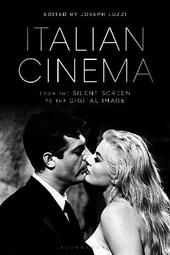
|
Italian Cinema from the Silent Screen to the Digital Image
Hardback
Main Details
| Title |
Italian Cinema from the Silent Screen to the Digital Image
|
| Authors and Contributors |
Edited by Joseph Luzzi
|
| Physical Properties |
| Format:Hardback | | Pages:440 | | Dimensions(mm): Height 229,Width 152 |
|
| Category/Genre | Films and cinema |
|---|
| ISBN/Barcode |
9781441174932
|
| Classifications | Dewey:791.430945 |
|---|
| Audience | |
|---|
| Illustrations |
59 bw illus
|
|
Publishing Details |
| Publisher |
Bloomsbury Publishing Plc
|
| Imprint |
Bloomsbury Academic USA
|
| Publication Date |
20 February 2020 |
| Publication Country |
United States
|
Description
In this comprehensive guide, some of the world's leading scholars consider the issues, films, and filmmakers that have given Italian cinema its enduring appeal. Readers will explore the work of such directors as Federico Fellini, Michelangelo Antonioni, and Roberto Rossellini as well as a host of subjects including the Italian silent screen, the political influence of Fascism on the movies, lesser known genres such as the giallo (horror film) and Spaghetti Western, and the role of women in the Italian film industry. Italian Cinema from the Silent Screen to the Digital Image explores recent developments in cinema studies such as digital performance, the role of media and the Internet, neuroscience in film criticism, and the increased role that immigrants are playing in the nation's cinema.
Author Biography
Joseph Luzzi is Associate Professor of Italian and Director of Italian Studies at Bard College, USA, and the author of Romantic Europe and the Ghost of Italy (2008), which received the MLA's Scaglione Prize for Italian Studies and was named an Outstanding Academic Title by Choice (2009).
ReviewsThis collection of carefully-researched essays forms a multifaceted, functional, and up-to-date reference volume that should be on the shelf of every cinephile and student of Italian cinema. * Federico Pacchioni, Associate Professor of World Languages and Cultures, Chapman University, USA * The writers assembled here by Joseph Luzzi - some of them well-known scholars at the top of their game, others new voices emerging with power and flair - engage us at all stages of this rich new volume on Italian cinema. Here is a reference work that makes good its title promise - to cover an entire history, from the age of silent screen to digital images of more than a century later. The various chapters weave pathways into existing knowledge, extending lines of inquiry in a variety of enticing directions. Individual film critics here take different approaches, but in all cases the writing styles are cogent, intriguing, and a challenge both to other scholars and to the general reader. A clear overall chronology by Mattia Acetoso leads the volume. Each further chapter has a comprehensive bibliography and filmography of the particular aspect of Italian cinema under consideration. In all respects the contributors prove worthy of the volume's dedicatee, Millicent Marcus, whose pioneering work in the field has for decades drawn others magnetically to it, and whose own contribution here is one of many pieces of exemplary exploration. Those readers who are well acquainted with aspects of Italian cinema will find their senses of it revitalised, discovering unknown films to watch and old favourites to consider in new ways. Those by contrast who so far know relatively little will receive guidance here, and stimulation to commence their own exploration with fascination and in bold individual ways. Here is a volume that will enhance love of and expertise about Italian cinema - and indeed Italian culture more generally, since all the contributions are richly contextualised - for many years to come. * Jonathan White, Professor Emeritus in Literature, University of Essex, UK *
|